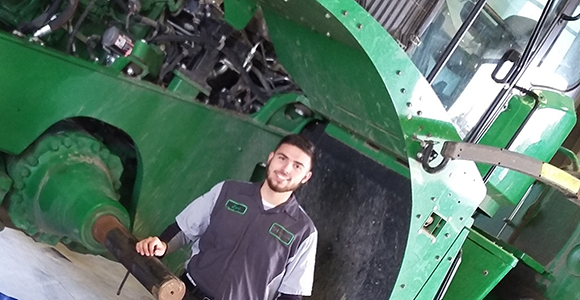
Student Jose Perez benefited from Merced College career center tailored to needs of CTE students (Photo Credit: Merced College)
A broken-down car or unreliable childcare can make the difference between completing a certificate program and getting a good job or continuing the cycle of struggle familiar to the hundreds of students pursing Career Technical Education (CTE) at community colleges across the state. Merced College has designed a new support system specifically to assist these aspiring students in completing their coursework and transitioning from school to employment.
The Workplace Internship Network (WIN) at Merced College provides personalized CTE completion counseling and connects students to internships that help launch their careers.
“The majority of students we see are first generation college students,” said James Andersen, Merced dean of instruction for Agriculture, Industrial Technology and Kinesiology, and one of the architects of WIN. With hundreds of CTE students at Merced, Andersen recognized how significantly their needs differed from those who are studying to transfer to a four-year university.
“We get so many students that come from families that are struggling to make ends meet, and they can earn a good salary if they have marketable skillsets,” Andersen said. But first, they have to complete training and find work. Many of his students confront very basic challenges like securing transportation to class, getting childcare while they attend school or figuring out how to write a resume or participate in a job interview.
Searching for a solution, Andersen met about two years ago with leaders from the community colleges in his geographic area to discuss the needs of these particular students and how best to help them succeed. Leadership from College of the Sequoias, Porterville College, San Joaquin Delta, Taft College, WHCC Lemoore, WHCC Coalinga, and Modesto Junior College shared best practices and collaborative strategies to support the success of CTE students.
Together, the collaborative group determined that a career center separate from the more traditional transfer center could provide the pathway these students need. The group continues to meet quarterly as each school ramps up the program at their own pace, based on their individual student populations and resources. Funding for the career centers comes, in part, from the CTE Enhancement Funds and further support will come from the Strong Workforce Program.
The Strong Workforce Program is a statewide initiative that utilizes California’s community colleges as essential training partners in providing skilled workers to fill workforce gaps and support economic recovery at the local, regional and state levels.
Back at Merced College, Autumn Gardia is the face of the WIN program. She meets with local industry partners to evaluate their entry-level employee needs and confers with them on how best to onboard the college program completers. She also regularly visits the classrooms and labs of CTE students to let them know she’s available to help them manage their success in school and transition to work.
Another key player in the Career Center at Merced College is imbedded CTE Counselor Araceli Gonzalez. She works closely with Gardia to meet the counseling needs of CTE students and watch for any issues that can negatively impact student success. When students have a friendly face like Gonzales to turn to in times of need, they are more likely to ask for help rather than giving up.
“I looked at my family and how we have struggled due to a lack of education,” said Merced student Jose Perez, a beneficiary of the new WIN office.
Perez’s program, Mechanized Agriculture Technology, is one of the nine career training programs that are currently aligned with the WIN program. The others are Nursing, Diesel Equipment Technology, Welding, Computer-Aided Drafting, Computer Networking, Automotive, Industrial Electric Technical, and Industrial Maintenance. In addition to locating post-certificate internship experiences, the program is also working to shorten completion times for certificates so that students can find employment more quickly. The Welding certification, for example, is now available as an 18-week program instead of a three- or four-semester program.
When Perez completed his certificates in Compact Power Equipment, Diesel Technology, and Mechanized Agriculture, he didn’t have to take the next step of finding a job alone. Through the WIN office he was connected to a 90-day paid internship at Foster Farms. Perez didn't just gain valuable work experience and earn a check using the skills he learned at Merced. “The internship helped me to build confidence,” Perez said.
Perez would have been hard-pressed to find an internship like this on his own. It’s the relationships Merced is building with companies like Foster Farms, Gallo, Dole, Morning Star and Laird that pave the way to real world work and success for students like Perez.
“I want to make a change for my future,” said Perez. The vision of leaders like Andersen and his collaborators, in conjunction with funding from Strong Workforce Program, are ensuring that students like Perez have the tools and support they need to meet California’s workforce requirements.

